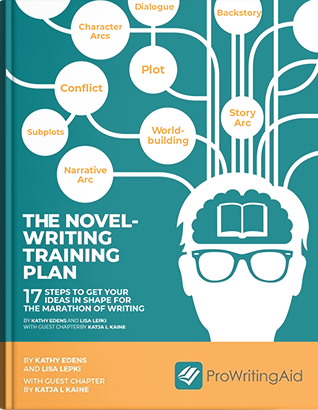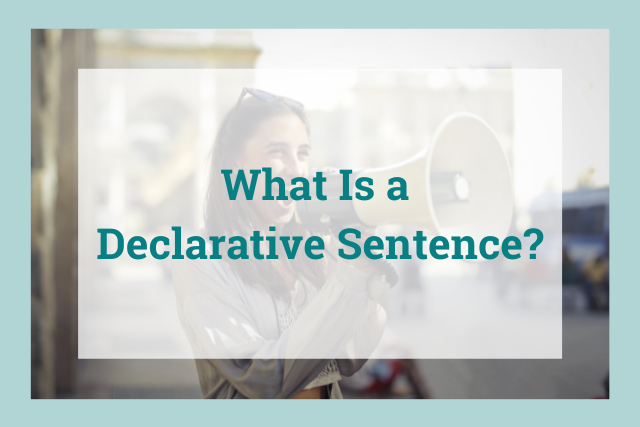
There are four types of sentences in the English language, and all of them accomplish different things.
If you want to be a successful writer, you’ll need to understand how to use each one. The most common of the four is called a declarative sentence.
So what is a declarative sentence? The short answer is that a declarative sentence is a sentence that makes a statement and ends with a period.
This article will explain what a declarative sentence is and provide you with examples from literature.
- What Is a Declarative Sentence?
- What Are the Differences Between Declarative Sentences, Interrogative Sentences, Exclamatory Sentences, and Imperative Sentences?
- What Are Examples of Declarative Sentences in Literature?
- How Do You Construct a Simple Declarative Sentence?
- How Do You Use a Declarative Sentence to Ask a Question?
What Is a Declarative Sentence?
A sentence is declarative if it ends in a period and expresses a fact or opinion.
Declarative sentences are aptly named because their purpose is to declare something. Every declarative sentence passes on some kind of information.
Here are some examples of declarative sentences:
- I’m going to be a published author someday.
- Two of her friends came late to her birthday party.
The Earth revolves around the sun.
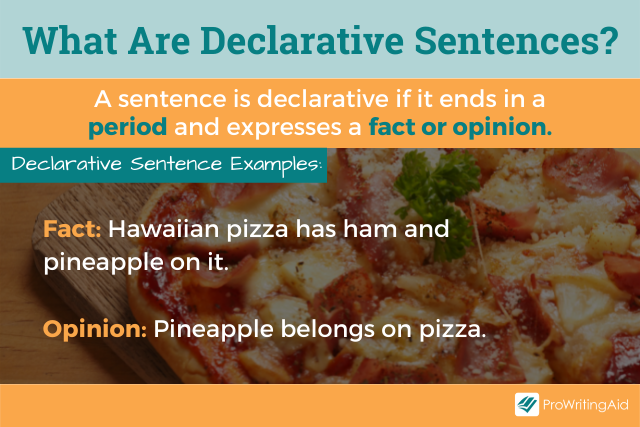
What Are the Differences Between Declarative Sentences, Interrogative Sentences, Exclamatory Sentences, and Imperative Sentences?
Declarative sentences are one of four types of sentences.
The other three types of sentences are interrogative, exclamatory, and imperative sentences.
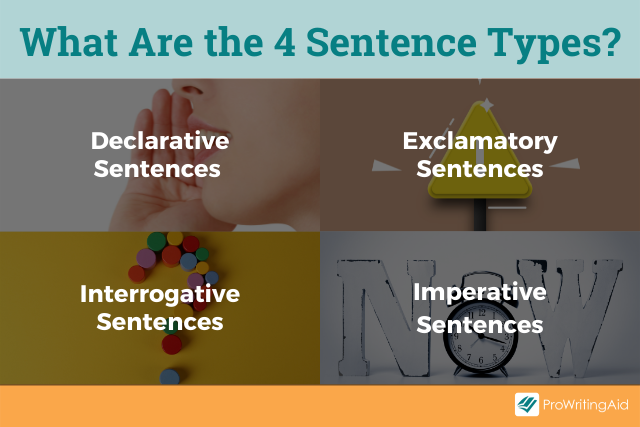
Interrogative Sentences
Interrogative sentences ask a question and end with a question mark.
Examples of interrogative sentences:
- Who are you?
- What’s going on here?
- Is that a llama or an alpaca over there?
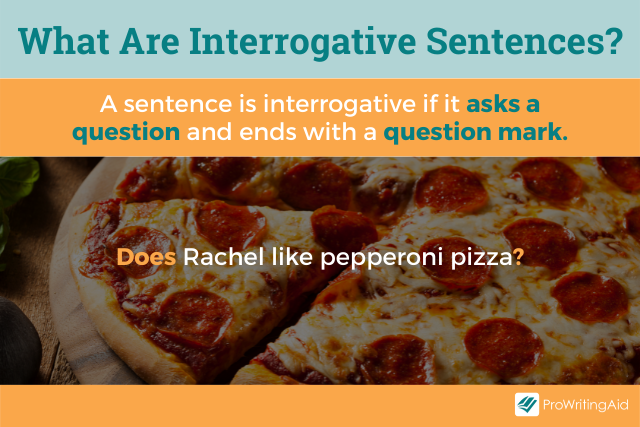
Exclamatory Sentences
Exclamatory sentences express a strong emotion—surprise, joy, anger, for example—and end with exclamation points.
Examples of exclamatory sentences:
- Hurray!
- Darn it!
- Aw, what a cute alpaca!
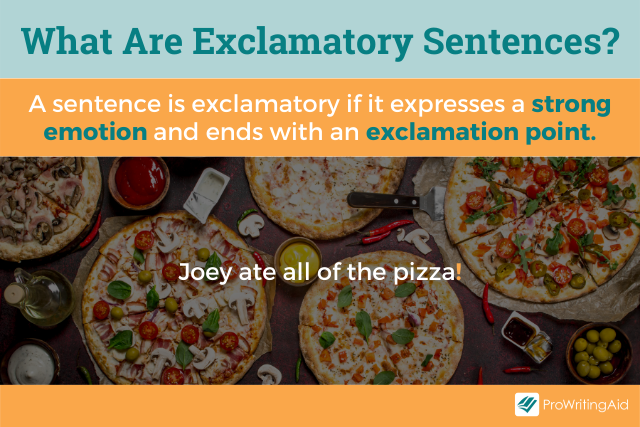
Imperative Sentences
Imperative sentences give a command, and end with either a period or an exclamation point.
Examples of imperative sentences:
- Go away!
- Dance like nobody’s watching.
Please let me pet that alpaca.
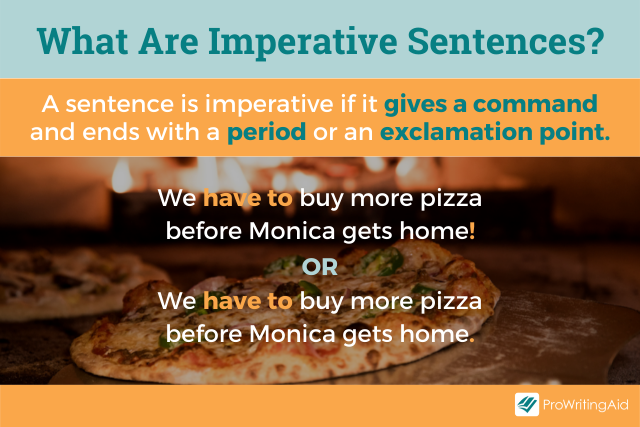
If a sentence asks a question, expresses a powerful emotion, or gives a command, you know it’s not a declarative sentence.
What Are Examples of Declarative Sentences in Literature?
Let’s take a look at some declarative sentence examples from successful books.
Notice how every sentence below ends in a period and states some kind of fact or opinion. They’re on all types of subjects, but they all declare something.
“I know it started being over with Joel when I’d open a bottle of wine and he wouldn’t drink it. Sharing things is how things get started, and not sharing things is how they end.”—Goodbye, Vitamin by Rachel Khong
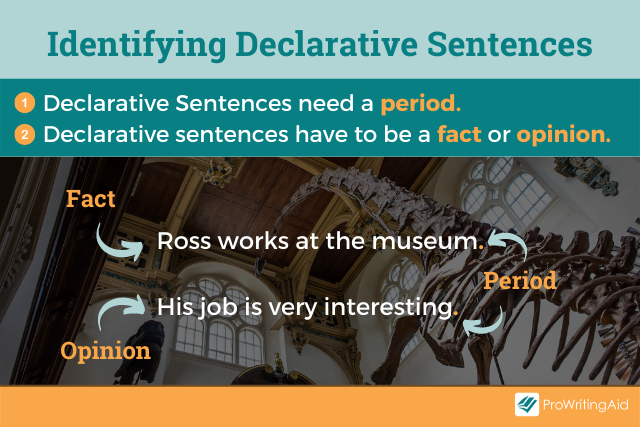
“Having faith in God did not mean sitting back and doing nothing. It meant believing that you would find success if you did your best honestly and energetically.”—The Pillars of the Earth by Ken Follett
“Truth matters. Truth has always been the thing I’m after, the most important thing. But sometimes, to get to the truth, detours through fiction are necessary.”—Magic for Liars by Sarah Gailey
“The house was very still. Far off there was a sound which might have been beating surf or cars zooming along a highway, or wind in pine trees. It was the sea, of course, breaking far down below. I sat there and listened to it and thought long, careful thoughts.”—Farewell, My Lovely by Raymond Chandler
“The woman’s name is Essun. She is forty-two years old. She’s like most women of the midlats: tall when she stands, straight-backed and long-necked, with hips that easily bore two children and breasts that easily fed them, and broad, limber hands.”—The Fifth Season by N.K. Jemisin
“With me as the glaring exception, my father molded the world around him to his liking. The problem, of course, was that Baba saw the world in black and white. And he got to decide what was black and what was white. You can’t love a person who lives that way without fearing him too.”—The Kite Runner by Khaled Hosseini
“Time was simple, is simple. We can divide it into simple parts, measure it, arrange dinner by it, drink whisky to its passage. We can mathematically deploy it, use it to express ideas about the observable universe, and yet if asked to explain it in simple language to a child—in simple language which is not deceit, of course—we are powerless. The most it ever seems we know how to do with time is to waste it.”—The First Fifteen Lives of Harry August by Catherine Webb
“Perhaps, as we say in America, I wanted to find myself. This is an interesting phrase, not current as far as I know in the language of any other people, which certainly does not mean what it says but betrays a nagging suspicion that something has been misplaced. I think now that if I had had any intimation that the self I was going to find would turn out to be only the same self from which I had spent so much time in flight, I would have stayed at home.”—Giovanni’s Room by James Baldwin
“There is an unprecedented gathering of illusionists in the lobby of the theater. A gaggle of pristine suits and strategically placed silk handkerchiefs. Some have trunks and capes, others carry birdcages or silver-topped canes. They do not speak to each other as they wait to be called in, one at a time, referenced not by name (given or stage) but by a number written on a small slip of paper given to them upon arrival.”—The Night Circus by Erin Morgenstern
How Do You Construct a Simple Declarative Sentence?
Most simple declarative sentences follow this word order: subject-verb-object-place-time.
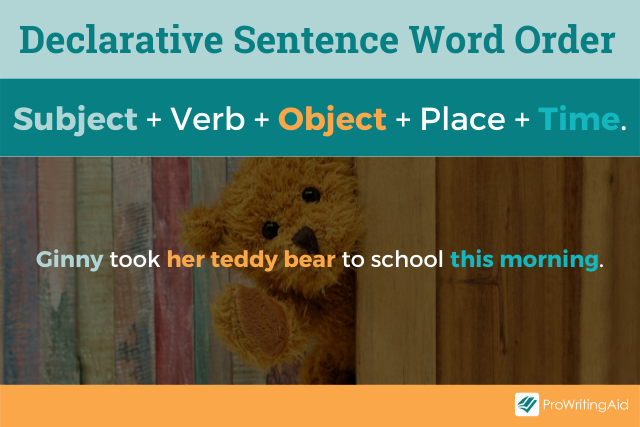
The subject and the verb are the two crucial components. The rest are optional. Here are some declarative sentences with just a subject and verb:
- I cooked.
- She drove.
- He wants to paint.
You can add an object.
- I cooked dumplings.
- She drove her sister’s car.
- He wants to paint his girlfriend’s portrait.
After that, you can add a place.
- I cooked dumplings at my friend’s house.
- She drove her sister’s car to work.
- He wants to paint his girlfriend’s portrait in his studio.
And finally, you can add a time as well.
- I cooked dumplings at my friend’s house yesterday.
- She drove her sister’s car to work this morning.
- He painted his girlfriend’s portrait in his studio tomorrow.
How Do You Use a Declarative Sentence to Ask a Question?
Not all sentences that ask questions have to be interrogative sentences.
Sometimes, you can use a declarative sentence to ask a question indirectly.
Take this sentence, for example: “I wonder if my friend will pick me up after work.”
In this case, the sentence includes a question, but it’s an indirect question, because it’s framed within a declarative sentence.
That’s why it still needs to end with a period, not a question mark.
The interrogative version of the question above would be: “Will my friend pick me up after work?” Because this is an interrogative sentence, the “will” comes before “my friend.”
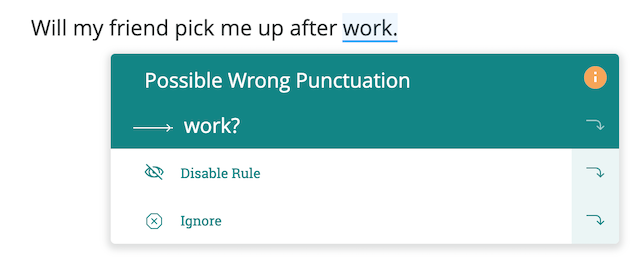
ProWritingAid’s Realtime Grammar checker can help you determine the difference between declarative sentences and interrogative sentences by suggesting punctuation changes if necessary.
As you can see in the example, this is an interrogative sentence and therefore requires a question mark to make sense.
You can look at the word order to figure out whether the sentence is a declarative or interrogative one. The subject and verb usually get inverted for interrogative sentences.
- Declarative sentence (indirect question): My mother asked me what time I’d be home from the party.
- Interrogative sentence (direct question): What time will I be home from the party?
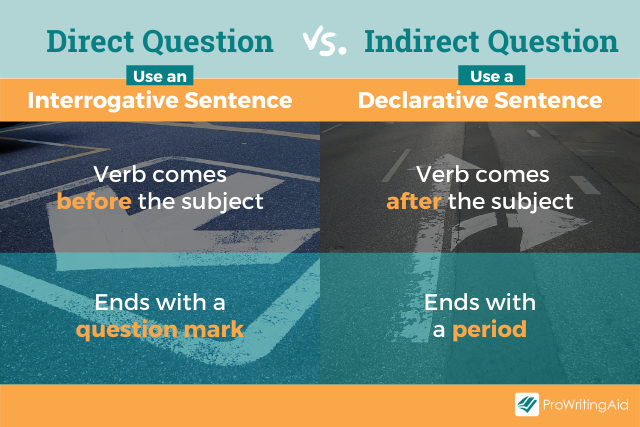
Final Words
Now you know how to identify and construct declarative sentences.
Was this article helpful? Let us know in the comments.

